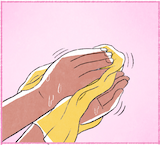

เขากำลังเฮ็ดหญัง เขากำลังเซ็ดมือ
แล้วเขาเซ็ดมือเฮ็ดหญัง กะเขาอาดสิไปหัวกะไปล้างมือมา หลือว่าไปทำความสะอาดมือของเขามา เขาอาดสิไปจับอันนั้นจับอันนี้ที่มันเปี้ยนมือ หลือว่ามือมันสกกะปก มือมันเปี้ยนเนาะ เขากะเอาไปล้างมือ เจ้าของหนิกะไปล้างมือ แล้วกะมาเซ็ดผ้าให้มือมันแห้ง บ่ให้มือมันเปียกเนาะ
แล้วเขาใซ้อี่หยังเซ็ดมือ เขากะใซ้ผ้านั้นหละ ผ้าสีเหลียง กำลังเซ็ดมือ เซ็ดให้มันแห้ง เซ็ดให้มันสะอาดเนาะ
แล้วเขาเซ็ดมือเนี้ย เขาสิเซ็ดโดนบ่ กะแล้วแต่เนาะ บางคนกะเซ็ดโดน บางคนกะเซ็ดบ่โดน ว่าแต่ว่ามือมันแห้งแล้ว น้ำมันเซา น้ำมันบ่เปียกแล้ว น้ำมันบ่ติดมือเฮาแล้ว เฮากะพอเนาะ
15
เขากำลังเฮ็ดหญัง กะมีพุซายคนหนึ่ง เขากำลังเซ็ดโต
เขาใซ้ผ้าเซ็ดโต ผ้าขนหนูนี้หละ หลือว่าผ้าเซ็ดโตนี้หละ กำลังเซ็ดโตของเขา
แล้วเขาเซ็ดโตเฮ็ดหญัง เขาอาดสิหัวกะอาบน้ำมาแล้ว หลือว่าหัวกะอาบน้ำแล้ว เขากะเลยสิเซ็ดโตให้มันแห้ง เพื่อที่ว่าสิบ่ให้โตเปียก หลือว่าบ่ให้หัวเปียก บ่ให้อี่หยังเปียก ให้บ่ให้อะวัยยะวะของเฮาเนี้ยเปียก เฮากะเลยต้องเซ็ดผ้า เออ เซ็ดโต เอาผ้าเซ็ดโตมาเซ็ด หลือว่าเอาผ้าขนหนูมาเซ็ดให้มันแห้งเนาะ
Link to overview page
Link to dictionary
| Isaan | Pronunciation | Tones | Thai | English/Notes |
|---|---|---|---|---|
| เขา | khao | M | เขา | personal pronoun: he, she |
| กำลัง | gam-laŋ | M-HR | กำลัง | auxiliary indicating continuous or progressive action |
| เฮ็ด | het | H | ทำ | to do, to make |
| หญัง | ɲaŋ | M | อะไร, เป็นหญัง = ทำไม | 1. what {เขากำลังเฮ็ดหญัง = What is he doing?} {ธูปเอาไว้เฮ็ดหญัง = What are incense sticks for?} 2. something, anything, (nothing) 3. เป็นหญัง[...]คือ in initial position: why {เป็นหญังเขาคือใส่บักพิกลงไปในกวยเตียว = Why is he putting chili in [his] noodle soup?} {เป็นหญังหน้าต่างมันคือเปิด = Why is the window open?} {เป็นหญังมันคือมีควนไฟ = Why is there smoke?} |
| เซ็ด | set | H | เช็ด | to wipe, to rub, to clean {เซ็ดโต = to dry oneself [with a towel]} |
| มือ | mʉ: | HR | มือ | 1. hand 2. front leg/paw (e.g., of a cat) |
| แล้ว | lɛ:o | HF | แล้ว | 1. finished 2. already 3. and then, and next (especially แล้วกะ) 4. auxiliary for past tense |
| กะ | ga | M | ก็ | 1. then, consequently 2. also |
| อาด | a:t | LF | อาจ | 1. might, may, will 2. likely |
| สิ | si | M | จะ | future tense auxiliary {เขากำลังสิตื่น = he's about to wake up} {สิไปตะหลาด = [I'm] going to the market} |
| ไป | pai | M | ไป | 1. to go 2. auxiliary indicating action extending into the future |
| หัว | hu:a | M | เพิ่ง | just, just now, only just {คนที่หัวกะเคยพ้อกัน = someone [we've] just met} {หัวกะตื่น = [I've] just woken up} {หัวกะซักมา = [the shirt has] just [been] washed} |
| ล้าง | la:ŋ | HF | ล้าง | to wash |
| มา | ma: | HR | มา | 1. to come 2. auxiliary expressing action towards the present or focal time {กะคุเฮ็ดมาจากอี่หยัง = What is the bucket made of?} {แล้วเขากะเก็บเงินจากพุนั้นมา = and then she takes the money of that person} |
| หลือ | lʉ: | M | หรือ | or |
| ว่า | wa: | H | ว่า | 1. that, as {คำว่า X = the word X} 2. to say |
| ทำความสะอาด | tham-khwa:m-sa-a:t | HR-HR-M-LF | ทำความสะอาด | to clean, to clean up, to do the cleaning |
| ของ | khɔ:ŋ | M | ของ | of, belonging to |
| จับ | jap | M | จับ | 1. to grasp, to hold {เขาจับมือกัน = they're holding hands} {เขายืนจับไอติมอยู่ = she's standing, holding an ice cream} 2. to catch, to arrest {จับพุล้าย = to arrest a criminal} |
| อัน | an | M | อัน | 1. thing, object 2. general clf. for objects |
| นั้น | nan | HF | นั้น | that, there |
| นี้ | ni: | HF | นี้ | 1. this 2. here |
| ที่ | thi: | H | ที่ | 1. that, which {คนที่ยืนอยู่ฝั่งขวา = the person which is standing on the right = the person standing on the right} {เว้าคำที่บ่สุพาบ = to speak words which are impolite = to speak impolitely} 2. for ordinal numbers {ที่สาม = third} |
| มัน | man | HR | มัน | it (also used to refer to people) |
| เปี้ยน | pi:an | HF | เปื้อน | dirty, stained, soiled |
| สกกะปก | sok-ga-pok | M-M-M | สกปรก | dirty |
| เนาะ | nɔ | H | เนาะ | final particle: makes the statement softer, looking for agreement |
| เอา | ao | M | เอา | to take, to give {เขากำลังเอาก่องไปซั่ง = he's taking the boxes to weigh them} {หมอกำลังเอายาให้คนป่วยกิน = the doctor is giving medicine to the patient} {เอาไว้ถ้า = is for, is used for, has the purpose of} |
| เจ้าของ | jao-khɔ:ŋ | HF-M | เจ้าของ | 1. personal pronoun: oneself 2. owner |
| หนิ | ni | M | นี่แหละ, เหรอ/หรอ | 1. particle used to emphasize a statement or form (or add to) a question {เป็นตาแซบคือหญังหนิ = it's really tasty} {เคี่ยงพอเท่าๆ หนิ = the [radio] is appropriately sized (i.e., not too large)} 2. variant of นี้ = this Notes: translation to be determined; maybe sometimes like Thai นี่แหละ; other examples given: อยู่ใสหนิ อยู่ตลาดหนิ กินเข้าไป่หนิ |
| ผ้า | pha: | LF | ผ้า | 1. clothes 2. cloth |
| ให้ | hai | LF | ให้ | 1. to give {หมอกำลังเอายาให้คนป่วยกิน = the doctor is giving the patient medicine} 2. for 3. to allow, to be allowed |
| แห้ง | hɛ:ŋ | LF | แห้ง | dry |
| บ่ | bɔ: | H | ไม่ | 1. no, not 2. question particle, transforming a statement into a question Notes: spelling exception in line with common usage on social media |
| เปียก | pi:ak | LF | เปียก | wet |
| ใซ้ | sai | HF | ใช้ | to use |
| อี่หยัง | i:-yaŋ | H-M | อะไร | 1. what {นี้คืออี่หยัง = What is this?} {มื้อนี้เจ้าเฮ็ดอี่หยัง = What are you doing today?} {กินเข้างายกับอี่หยัง = What did you have for breakfast?} 2. something, anything, (in negations) nothing {บ่ต้องเฮ็ดอี่หยังอีกเลยนอกจากใส่ปุย = [we] don't need to do anything besides adding fertilizer} |
| นั้นหละ | nan-la | HF-M | นั่นแหละ | auxiliary for emphasis at the end of a phrase |
| สี | si: | M | สี | 1. color 2. colored pencil, crayon |
| เหลียง | li:aŋ | M | เหลือง | yellow |
| สะอาด | sa-a:t | M-LF | สะอาด | clean |
| เนี้ย | ni:a | HF | เนี้ย | variant of นี้ = this, here |
| โดน | do:n | M | นาน | time: long |
| แล้วแต่ | lɛ:o-tɛ: | HF-H | แล้วแต่ | up to, depending on |
| บาง | ba:ŋ | M | บาง | 1. some {สัดบางโตบ่มีขา = some animals don't have legs} {บางคนสิมักกินกวยเตียวแทนเข้า = some people like to eat noodle soup instead of rice (dishes)} {บางสิ่งบางอย่าง = something, anything} 2. thin |
| คน | khon | HR | คน | person, people |
| ว่าแต่ | wa:-tɛ: | H-H | แล้วแต่ | whatever, anything that {ว่าแต่ใส่แล้วมันแซบกะใส่ลงไป = whatever is tasty can be put in} |
| น้ำ | na:m | HF | น้ำ | 1. water 2. drink, soft drink, juice |
| เซา | sao | HR | จบ | 1. to stop, to be finished {น้ำมันเซาไหลแล้ว = the water has stopped flowing} {ฝนเซาตกแล้ว = it has stopped raining} {มันสิเซาเสียงดัง = (phone) it stops ringing loudly} 2. to prevent, to hinder 3. to rest {เซาเมี่ยย = to rest} |
| ติด | tit | M | ติด | 1. to be attached to, to be on/at {สะวิดเปิดไฟติดอยู่ข้างฝาบ้าน = the light switch is on the wall} {มันสิมีน้ำติดอยู่โตของเขา = there is water on his body} 2. to stick (to), to attach (to) |
| เฮา | hao | HR | เรา | 1. personal pronoun: we 2. personal pronoun: I |
| พอ | phɔ: | HR | พอ | 1. just when, just after, as soon as 2. enough, adequate |
| มี | mi: | HR | มี | 1. to have 2. there is |
| พุซาย | phu-sa:i | H-HR | ผู้ชาย | man, male |
| หนึ่ง | nʉŋ | H | หนึ่ง | 1. one 2. after adjective: intensifier {บักคักหนึ่ง = very much} {อันบักใหญ่หนึ่ง = very large}, or attenuates the meaning {กะดาดมันแผ่นน้อยๆ หนึ่ง = the piece of paper is [relatively] small} |
| โต | to: | M | ตัว | 1. body, self 2. clf. for animals, characters/letters/consonants, appliances, clothes (e.g., pairs of trousers, shirts) |
| ผ้าเซ็ดโต | pha:-set-to: | LF-H-M | ผ้าเช็ดตัว | towel, bath towel Notes: see also ผ้าขนหนู |
| ผ้าขนหนู | pha:-khon-nu: | LF-M-M | ผ้าขนหนู | towel, bath towel Notes: see also ผ้าเซ็ดโต |
| นี้หละ | ni:-la | HF-M | นี่แหละ | auxiliary for emphasis at the end of a phrase |
| อาบน้ำ | a:p-na:m | LF-HF | อาบน้ำ | to take a bath/shower |
| เลย | lə:i | HR | เลย | 1. futher on, beyond, past {เข็มน้อยเลยเลขสิบสองไป = the minute hand has passed number twelve} 2. too much 3. at all 4. definitively 5. completely, utterly |
| เพื่อที่ | phʉ:a-thi: | H-H | เพื่อที่ | in order to, so that Notes: the vowel เอือ is likely to be a Thai loan |
| หัว | hu:a | M | หัว | 1. head 2. clf. for onions, bulbs of garlic |
| อะวัยยะวะ | a-wai-ya-wa | M-HR-M-H | อวัยวะ | organ, body part |
| ต้อง | tɔŋ | HF | ต้อง | to have to, must |
| เออ | ə: | M | 1. discourse marker: confirmation 2. discourse marker: turn-taking 3. discourse marker: preceding a correction 4. filler word |